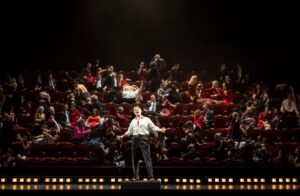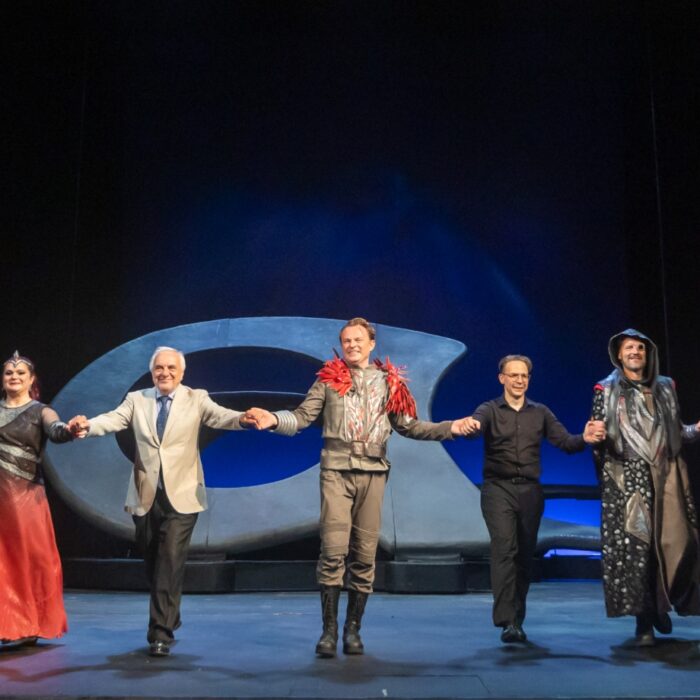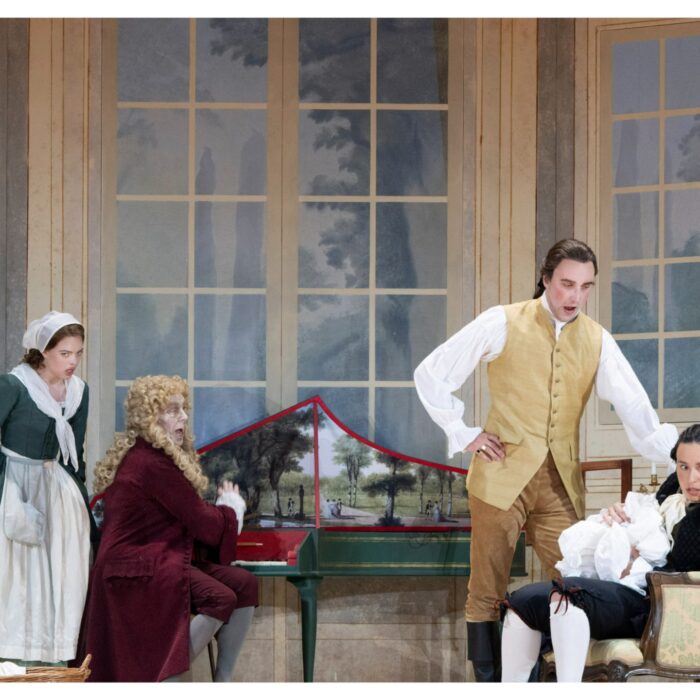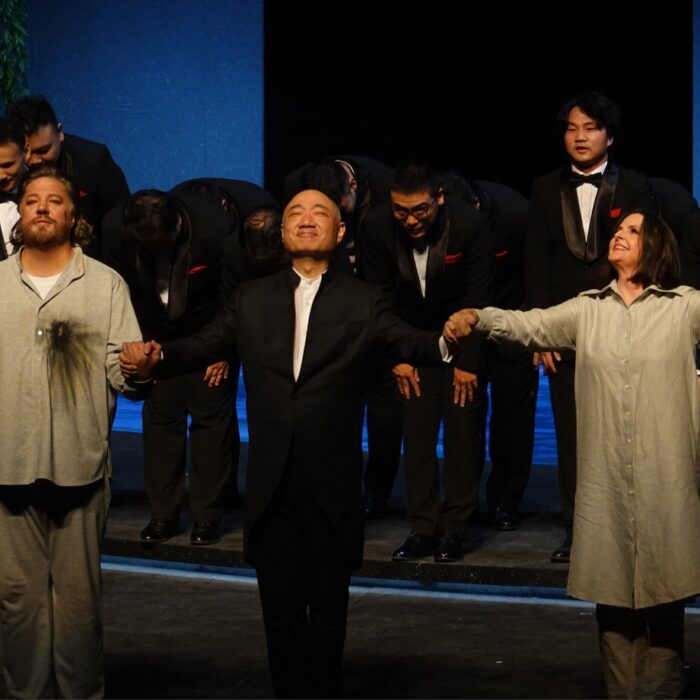
Opéra National de Paris 2023-24 Review: Les Contes d’Hoffmann
Benjamin Bernheim & Christian Van Horn Reign Supreme in Robert Carsen’s Immaculate Production
By David Salazar(Credit: Emilie Brouchon)
Offenbach’s “Les Contes d’Hoffmann” might be the most passionate love letter ever written to opera. After a career creating operettas and comic works, the composer set his sights on creating an opera, a work that would align with his style and sensibilities, but also one that would transcend them. And from it came a work that is singular in the repertoire – a searing exploration of character, fantasy, love, and above all, the act of creation. Offenbach would die four months before the premiere of his masterpiece, but through it, his passion and genius lives on.
“Hoffmann” is one of those special operas in the repertory in that no definitive version exists. Throughout history, as discoveries have been made, the work has been arranged and re-arranged to suit differing musical tastes or, in more recent years, directorial visions. That alone makes “Hoffmann” one of the most interesting operas to attend, especially in different productions.
And as is often the case with operas like these, “Don Carlo” being another, it can take one brilliant stroke of directorial genius to create what one might define as the version of the opera.
That’s what Robert Carsen manages.
Iconic & Historic
His production, which is closing in on the quarter century mark is an institution at Opéra National de Paris. Numerous directors have been offered to do new productions of the opera and all have refused out of respect for Carsen. While it is likely not in the greatest condition, it probably merits some restoration so it remains with the company for years to come. It might as well be enshrined and consecrated as a piece of French cultural heritage, an immovable spectacle akin to the Met Opera’s “La Bohème.” Or, it should be presented at other major opera houses (ie. the Met, which could use a great “Hoffmann” production).
Admittedly I am very late to the party that is this production. But as is the case with timeless art, it’s never too late.
This production is what all modern productions of opera aspire to. Scratch that, what ALL opera productions aspire to. Carsen, known for his signature of theater within a theater, finds in Offenbach’s masterpiece the perfect embodiment of that. Carsen understands Offenbach’s celebration of creation and transforms it further into a celebration of operatic creation. As such, the experience plays out like three operatic acts with two prologues, each one allowing the viewer a different perspective of the process of creation. In Olympia’s Act we are behind the scenes watching the creation of props and robots for production. We see the proscenium in the distance. To the side, we see the tech team and stagehands as well as the musicians preparing for performance. The glorious second act, wherein Antonia is at conflict with her desire to perform, places the action in the pit and on the stage, this split embodying the conflicts taking place and constantly shifting the balance and power dynamics. Act three takes place on stage and in the audience; given that the main plot device of this sequence is the theft of Hoffmann’s reflection, it’s brilliant that the audience itself is allowed to see itself reflected during this moment. This is modernization done exquisitely with the direct drawing from the material at hand instead of fighting against it or looking to erase or recreate it. It’s confident directing in the sense that Carsen understands the material so deeply that he is able to transform it without destroying it.
The confidence of the direction extends to how the spaces are used. Nothing is wasted. No one is ever doing nothing. The challenge of a lot of opera directing is knowing where to look. A lot of times, a lot is going on and you just get lost in the messiness of all of it. Even when Carsen has a million characters on stage, he’s never unclear about where he wants your attention. Take the famed barcarolle, which opens up to just Giulietta and Niklausse alone, the seats shifting back and forth like the gondolas in Venice; it’s a brilliant allusion to the original setting of the opera while remaining true to Carsen’s vision. People slowly scatter in, engaging in all kinds of sexual excitement. The color palette is a rainbow of colors and yet it all feels contained, the entrance of the crowd never taking away from the two main soloists. When Hoffmann arrives, he takes centerstage amidst the crowd during the final moments of Act three. Again, we know not only where to look, but also who is at the center of the musical ensemble.
That’s the other brilliant stroke here. The music is allowed to live within the production and as part of it. Harp strokes in Act two are “interpreted” by the piano in the pit. When violins flutter in anticipation of the trio, Antonia opens the score. The violin aria is accompanied by Hoffmann trying to figure out how to play the violin. Olympia’s high notes are transformed into expressions of sexual satisfaction in one of the most geniusly staged scenes in any opera. Perhaps the lone blemish on the experience is the barcarolle itself with the velvet stage seats eating the sound. You can barely hear the singers during this moment and it’s shocking to me that given the production’s age, a solution has yet to be found. Given its popularity and importance to French operatic culture, it is crucial that a solution be attempted for future iterations of the production because this moment is too iconic to be its lone blemish.
Just some words on Act two. Antonia’s act is undeniably at the heart of the opera’s drama and character and in the context of Carsen’s production and Offenbach’s untimely death, it rings more vibrantly. Antonia just wants to sing but she’s not allowed to. She would die like her mother if she does. So she hangs out in the pit the entire time, obscured by the shadows and darkness of the place, always looking up at the closed curtain. Only a select few characters get a chance to strut on stage, including Frantz, who in this production is an employee who aspires to perform but just can’t, and Doktor Miracle, a conductor and the mastermind behind the deaths of the two women via art (also genius is that Carsen casts the villain character as a producer in the opening act, a conductor in Act two who leads an onstage ensemble in the final coda of the act, and a stage director in Act three; in this final act, we see him brilliantly direct Giuletta’s seduction of Hoffmann and then restage the concertato to set things up for the climax of the scene). All the other drama takes place down below. However, Miracle invokes the spirit of her mother (though here it’s more akin to an actor playing her mother) so that he can get Antonia to finally sing herself to death. Once the trio finishes, we get the big payoff as Antonia rushes up to the stage and collapses, her dream finally realized, only to be taken away, much in the same vein as Offenbach, who dreamed of composing an opera, never to get to enjoy its success. Adding to all this is the constant reference to the Commendatore from Mozart’s “Don Giovanni,” a direct reference from the opera itself that Carsen uses to mold the entire production. This statue appears numerous times and, just as he does in Mozart’s famed opera, here it is a reminder of Hoffmann’s doomed love affairs.
Flanking these three acts are the prologue and epilogue, which get differing sets, including one moment where an entire set for “Don Giovanni” rolls across the stage. I also defy you to find a more graceful and elegant operatic moment than the bar set ascending onto the stage and the people crowding in to fill in the atmosphere. Other brilliant touches include starting the opera with the Muse’s “La vérite, dit-on, soirtait d’un puits” as she approaches a drunk and unconscious Hoffmann and then concluding it with a duet in which the Muse revives him and leads him off into the light of creation. Or the Villains often entering from the center of the stage (except in the third Act where he is the first person to arrive on stage right, but gives the conductor in the pit the signal to go). Repeat experiences of this production would undoubtedly reveal a deeper understanding because it is loaded with layers.
What is also fascinating about the way this production is directed is that it is foolproof in the sense that it would retain its brilliance even when artists are on their most difficult nights. But conversely, it has the power that all great productions do of helping artists do their absolute best work. And when you have a great tenor at the center of it all, together, the singer and directorial vision can make truly transformative art.
That’s what happened on that performance on Dec. 18, 2023.
The Perfect Hoffmann
Operas like “Roméo et Juliette,” “Faust,” and, yes, “Les Contes d’Hoffmann,” feel like they were written for Benjamin Bernheim. The tenor possesses a voice of immaculate texture with a wide-range of colors to go with a robust technique, incredible high notes, and impeccable diction. But he also possesses a tremendous stage presence to go along with his incredibly nuanced musicodramatic sensitivity.
At the end of each of the acts, Hoffmann gives an impassioned cry to relate his big loss. In the first two Acts, he belts out for his two lovers and then in the third, he fires a high note over the chorus. Most tenors just go for broke on each of these final moments, but Bernheim gives them a musical arc. Bernheim’s interpretation of “Une automate” was tender and caressing, while his cry after Antonia’s demise was more desperate. Finally, his voice soared with intense loss at the close of the third Act on “Misérable,” clinching this build of intensity. It allowed the viewer / listener to feel the arc of the character and understand how it connected to the prologue and epilogue.
Ditto for his interpretation of Hoffmann’s big solo moments in each Act. “C’est elle! Elle sommeille” was delivered with delicacy, even the vocal crescendoes to the climax of the lines maintaining that gentility even in their brightness. It contrasted tremendously with his interpretation of “Ah! Sa figure était charmante.” The structure of both passages is similar – starting soft and then rising and rising into an emotional outburst at its peak, the voice often in its upper reaches (ditto for the Act three aria “O Dieu! de quelle ivresse”). But where “C’est elle’s” longing was full of warmth and hope, “Ah! Sa Figure” was full of increasing pain, the voice starting off softly, before building with furious intensity until it soared over the searing violins on “Aux cieux qui l’écoutaient.” The repetitions of “Kleinzach” in the prologue and then in the Epilogue featured a similar contrast; while the former saw Bernheim far more composed and jovial, the final one, in which he watches Stella walk away with Lindorf, was full of anguish, torment, loss.
Throughout the Antonia act, his singing was more gentle, accentuating the fragile nature of his beloved. Throughout their duet, his voice always retained a piano quality, and even when ascending to the highest notes, that caressing restraint remained. During the trio with Crespel and Miracle, Hoffmann shuffles about the stage, hiding from sight as he tries to unearth the great mystery of Antonia’s illness. His singing here was also piano, emphasizing Hoffmann’s desire to remain hidden. But through it all, you could always hear every note, every word, his projection exemplary despite the softness of his interpretation.
His voice took on a more potent presence in Act three. One could sense Hoffmann losing grip and control, appearing drunk on stage during his first entrance and throwing money around later on. “O Dieu! de quelle ivresse” was impassioned in its desire and desperation, Bernheim’s voice at its most potent, each line growing stronger than anything he’d performed to that point. Adding to this was that he knelt and crawled toward Giulietta throughout. But the interpretation of the concertato opener “Hélas! Mon cœur s’égare encore” was perhaps his most stunning moment. In an opera where Hoffmann gushes his soul out every few bars, this moment of introspection (again, during an act where he loses his reflection and ability to see himself) is perhaps his most vulnerable. Bernheim’s singing here was pianissimo, emphasizing the fragility of Hoffmann’s being in that moment.
All of his vocal choices were supported by his physical portrayal of the character. Unstable and violent in the prologue and epilogue; anxious, confused, and in a daze in Act one; smooth and gentle in Act two; all over the place in Act three. Bernheim’s performance was an exemplar of what an opera artists should aspire to – complete immersion in both the dramatic and musical aspects of a role. It’s not one or the other, but both.
A Powerful Villain
As the Villains, Christian Van Horn proved a perfect counterpoint to Bernheim. Van Horn’s laugh said it all – he savored every moment as the saboteur to Hoffmann’s joy and happiness. Where Bernheim’s Hoffmann transformed over the course of the evening, Van Horn’s villains all retained that composure, that towering rigidity that reminded me constantly of the Commendatore stature. We could see it in how methodically he followed Antonia around the pit and then how he conducted the ensemble. Ditto for how he strode onstage for the first time in the opera, or the statuesque figure he cut when the sea of people parted for his appearance at the bar. Even when he was snorting cocaine or directing from the seats in Act three, his most nimble work on the night, that looming sense remained. He was simply the immovable object, the unstoppable force, the inevitable to Hoffmann’s adventures.
And his voice only furthered this, Van Horn sang with intense firmness throughout the night. He exuded confidence with every single note. He relished the opening aria “Dans les rôles d’amoureux langoureux” his singing ringing amply in the hall, every word and rhythm coming through with tremendous clarity. His voice shifted from the quieter passages on “Mes yeux lancent des éclairs” to vibrant explosions of sound on “Je suis vif” with flexibility and robustness, leaving us feeling that we were in the hands of someone always in control.
In an early confrontation between Hoffmann and Lindorf, Bernheim’s Hoffmann went at him repeatedly, forcing others to hold him back. Van Horn’s Lindorf? Poised. Unmoved. Steady. His singing was similarly solid and composed as he hurled back insults at the poet. During the trio, towering over Hoffmann and Crespel, Van Horn’s booming voice led the way, expressing the control he had over the proceedings. Throughout the trio, he “remained in the vocal background” but the darkness and grit of his sound always remained present, providing a potent contrast to the rising lines of Willis-Sørensen’s Antonia.
Perhaps his most impressive moment on the evening was “Scintille, diamante,” his voice softer, more delicate. It was the only instance of this kind of gentler singing from him and yet it was marked by a subtle graininess that underscored the character’s scheming. In ensuing moments with Antonia, Van Horn was more aggressive and pointed, a callback to his similar confrontation with Spalanzani.
This was as much a tour-de-force performance as Bernheim’s was, with an emphasis on “force.”
Four Contrasting Heroines
In contrast with the raw power in Van Horn’s take on the villains, Angela Brower provided more restraint as the Muse and Niklausse. Opening the opera with a playful “La vérite, dit-on, soirtait d’un puits,” she transmitted a confidence that would emphasize her role as a guide rather than a friend. She poked fun at Hoffmann throughout Act one and throughout her interpretation of “Voyez-la sous son éventail” she danced about, a smile all over her face throughout, the voice similarly bright and open. This contrasted nicely with the more introspective “Non! C’est une artiste.” This aria features two repetitions of “C’est l’amour, c’est l’amour vainquer,” an explosive of passionate vocal line. During the first half of the aria, Brower retained a softer tone, but for the return of this theme, her voice was round and full, climaxing on a solid high note to bring it all home. She also sang with similar finesse throughout the famed Barcarolle. It was interesting to also witness the increasing frustration Brower’s Nicklausse expressed toward Hoffmann, rushing away as he pursued Giulietta. At the close of the night, Brower delivered her most tender singing during “Des cendres de ton cœur,” dovetailing nicely with Bernheim’s similarly graceful legato. It was a perfect close to the night.
As Antonia, Rachel Willis-Sørensen’s ample soprano lived perfectly on the edge. With the biggest voice of the group, every ascension to an upper note or even her most forte singing powered into the hall with such force that it felt at times like it might be a bit much; she couldn’t quite match Bernheim’s piano singing during their duet and often overpowered him. However, it suited the intensity of Antonia’s longing and the precariousness of her situation. What’s more, there was a delicacy in her potency, which was borne out best during the duet with Hoffmann. But Willis-Sørensen shone best in the trio, her voice allowed to soar into full flight, growing more passionate with each line until she ascended all the way to a thrilling climactic high note that erupted brilliantly into the hall. And then we got the soprano’s softest singing of the night as she strode on stage, her final utterances hushed whispers. It was a perfect payoff both musically and dramatically to everything we’d heard and seen throughout the act.
As Giulietta, Antoinette Dennefeld had a dominant stage presence, always firm and poised, expressing her dominance over all around her. She shifted from truly silky singing in the Barcarolle to more opulent and rounded tones during her conquest of Hoffmann. Though she possessed an ample and, sometimes overzealous, vibrato in her upper range, Dennefeld was more cool and restrained in her vocal demeanor overall, proving a perfect contrast to Willis-Søresen’s passionate vocalization of Antonia. This restraint made her Giulietta more mysterious, more alluring.
As Olympia, soprano Pretty Yende was more of a mixed bag as she struggled to pull off the vocal bravura of “Les oiseaux dans la charmille.” Her coloratura was inarticulate and the intonation on her bright and potent high notes was adventurous, with some of her ascents into the upper reaches going sharp while others went slightly flat. That said, she did a solid job executing the perfection that is Carsen’s staging for this scene, drawing the biggest laughs from the audience and even getting a show-stopping ovation right after the “sex scene.”
Total Package
The rest of the cast was solid throughout with special mentions to Leonardo Cortellazzi in the multiple roles of Andrès, Cochenille, Pitichinaccio, and Frantz. His delivery of Frantz’s aria was one of the comical highlights of the evening. Christophe Mortagne and Vincente Le Texier were also major standouts, as was Sylvie Brunet-Grupposo as the Voice of Antonia’s mother. The weightiness of her voice complemented Van Horn and Willis-Sørensen perfectly throughout the trio.
And then comes the work of conductor Eun Sun Kim who proved formidable in the pit. From the opening notes to the final chords, she displayed firm control over both the ensembles and the pacing of the drama. Singers were well-supported and tempi were solid and propulsive. The Antonia act in particular felt gloriously executed, the orchestra feeling weightless in creating an ambiance of mystery and setting up the phantasmagoric climax perfectly. The woodwind colors were relaxed in the opening of the Barcarolle, contrasting perfectly with how she let the orchestral floodgates open at the climax when that same theme returns in a new light.
This was Bernheim’s last performance, so I can’t tell you to go watch it, but if the Opéra does broadcast or stream it on its services, this is one that I immediately recommend checking out. Or waiting for the production to come back to Paris in a few years (or somewhere else). Or watching Bernheim reprise the role next season. All in all, this was one of the finest performances I have seen all year, a true marriage of music and theater. A love letter to Offenbach’s love letter to opera.


